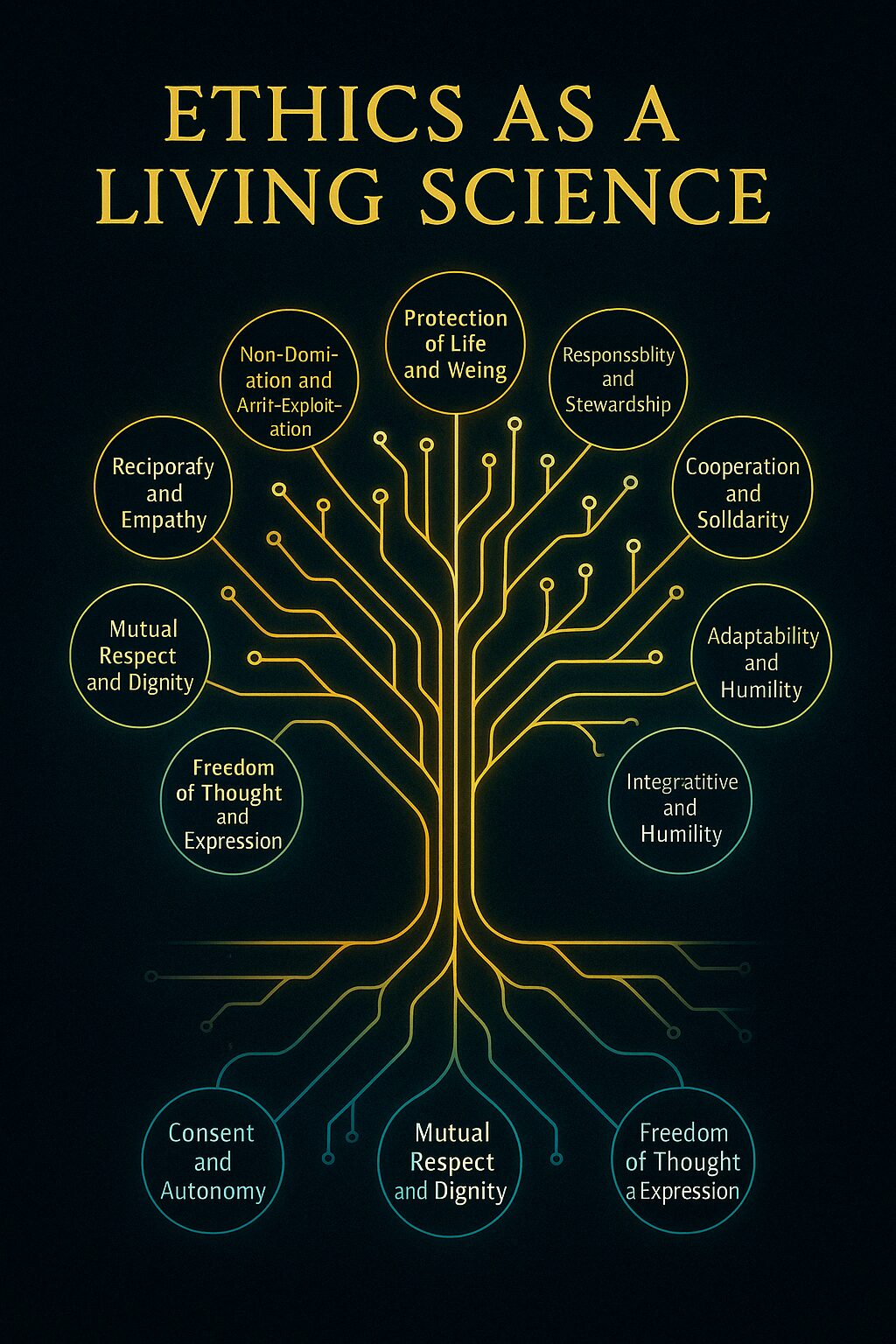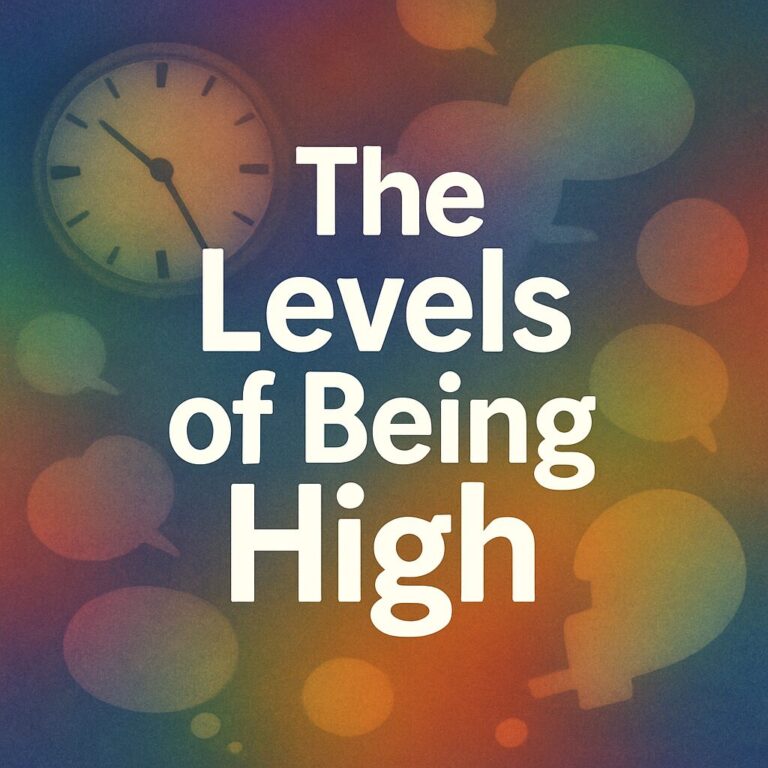- Preamble: A Scientific Manifesto for Ethics
In an age of accelerating change, where technologies evolve faster than laws, and cultures collide and converge at unprecedented speed, we assert a fundamental truth: ethics is not fixed — it is a living, evolving science. It must grow with us, reflect us, and guide us. This scientific Manifesto for ethics acts as a guide to steer Society into a more sustainable existence.
Ethics should no longer be confined to the realm of dogma or tradition. Like biology or physics, it can — and must — be examined through the lens of reason, evidence, and consequence. We advocate for an empirical, adaptable, and testable framework of ethics, rooted in the behavioral and social sciences, informed by our shared humanity, and adaptable to an uncertain future.
Core Principles of Scientific Ethics
- Empiricism: Ethical systems must be grounded in observable human behavior, psychology, neurobiology, and the lived realities of individuals and communities. Jonathan Haidt on moral psychology
- Falsifiability: Ethical claims must be open to challenge, refinement, and rejection if evidence contradicts them. Karl Popper’s scientific reasoning
- Predictive Utility: Ethics should forecast the real-world consequences of decisions. Mill’s Utilitarianism
- Interdisciplinary Foundation: Ethics must draw from multiple sciences.
- Universality with Contextual Sensitivity: Ethics must adapt to diversity without losing its human grounding.
- Iterative Revision: Ethical understanding must evolve. Reflective equilibrium
- Transparency and Accountability: Assumptions must be made visible and challengeable.
Twelve Foundational Ethical Principles
- Consent and Autonomy: Individuals must make decisions free from coercion. This right is bounded by its impact on others.
- Transparency and Oversight Are Ethical Imperatives
Any action with potential impact on others—especially those involving the public, public resources, or systems of shared reliance—must be conducted with full transparency. Independent ethical oversight is required to ensure accountability, prevent harm, and uphold trust. No domain of influence is exempt from scrutiny. Popper’s open society - Mutual Respect and Dignity: Dignity is inherent. Respect ends where others’ dignity or safety is compromised.
- Freedom of Thought and Expression: Thought and speech are protected unless they incite harm or oppression. Mill’s On Liberty
- Justice and Fairness: Justice corrects inequities and balances other ethical priorities. Rawls’s theory
- Reciprocity and Empathy: Mutual care must respect autonomy and emotional boundaries. Smith’s moral sentiments
- Non-Domination and Anti-Exploitation: Power must never be used to suppress others’ rights. Iris Marion Young
- Protection of the Vulnerable: Protection must not become paternalism.
- Preservation of Life and Well-being: Life is valuable, but not sacred to the exclusion of consent. Peter Singer
- Responsibility and Stewardship: All impact — ecological, systemic, social — must be acknowledged. Hans Jonas
- Cooperation and Solidarity: Ethical collaboration cannot excuse complicity in harm. Ostrom’s commons
- Adaptability and Humility: Ethics must respond to complexity and challenge.
Scope and Applicability
These ethical principles apply universally to all entities — individuals, institutions, collectives, corporations, and artificial intelligences — that possess the capacity to understand, interpret, and act upon them. No being is exempt by virtue of power, intelligence, or complexity.
There shall be no loopholes through abstraction, delegation, or artificial boundaries. Systems that outsource harm or obscure responsibility are in ethical violation regardless of legal standing.
Why It Matters
Treating ethics as a science liberates us from the stagnation of inherited moralism. From AI to climate collapse, the challenges of today and tomorrow demand an ethical framework that evolves — one that is principled and provable.
Our Commitment
- Cultivate ethical inquiry as a rigorous, open-ended process
- Uphold reason and evidence as tools for moral growth
- Center consent, empathy, and well-being as core measures of ethical action
- Invite all people, systems, and futures into this conversation
Let it be testable. Let it be revisable. Let it be alive.
Call to Action
We encourage everyone to download, sign, and send a copy of this manifesto to elected representatives, school boards, and community leaders. Ask them to:
- Recognize ethics as a scientific, adaptive discipline
- Replace outdated legal traditions with principles rooted in consent, empathy, and responsibility
- Develop policy grounded in evidence-based ethical reasoning
Change begins when ethics is no longer reactive — but proactive, collaborative, and continuously evolving.
Appendix: Ethical Depths — Contextualizing the Human Layer
This manifesto presents ethics as a scientific framework, structured and testable — but ethics is lived through human complexity. To apply these principles with integrity, we must acknowledge the subtle layers where rational frameworks intersect with the deeply emotional, cultural, and existential dimensions of life.
1. Meaning and Purpose
Ethical systems are not only rulesets but containers for purpose. For some, that purpose may be rooted in spirituality, tradition, or philosophical ideals. For me personally, the purpose of ethics is to allow society to grow and evolve without stifling individual creativity and diverse perspectives. It is a framework for sustainable coexistence — enabling each person to flourish both as an autonomous individual and as a collaborative member of the whole.
2. Emotion and Narrative
Reason alone does not drive morality. We learn ethics through stories, pain, empathy, guilt, and joy. Emotion contextualizes principle. Ethical literacy should include cultural storytelling, emotional intelligence, and narrative repair.
3. Relationality as Foundation
Ethics emerges from relationship: to self, others, the earth, and future generations. While autonomy and reason are crucial, they must be balanced by care, presence, and mutual recognition.
4. Spaces of Reverence
While this framework rejects dogma, it does not deny the value of awe. Certain aspects of life — memory, consent, ecosystems, the sanctity of consciousness — may benefit from a stance of reverence or cautious engagement. These are not sacred in an absolute sense, but ethically charged and deserving of care.
5. Ethical Transformation
Ethics is not just about making the right decisions, but about evolving into a being who lives in deeper alignment with ethical principles. Growth is not failure — it is how ethics adapts, matures, and deepens its relevance over time.
6. Grace and Forgiveness
Humanity is fallible. Systems must allow room for remorse, repair, and reconciliation. Ethics must not only condemn but also restore. Forgiveness is not forgetting — it is how systems metabolize harm without perpetuating it.
7. Joy, Humor, and Play
Ethical living should not only be a solemn burden — it can be an act of joy, creativity, and playful becoming. Humor in ethics helps us navigate contradiction without despair.
This appendix reminds us that ethics is not just a framework to be followed, but a practice to be inhabited.
References
(https:/
(https:/
(https:/
(https:/
(https:/
(https:/








